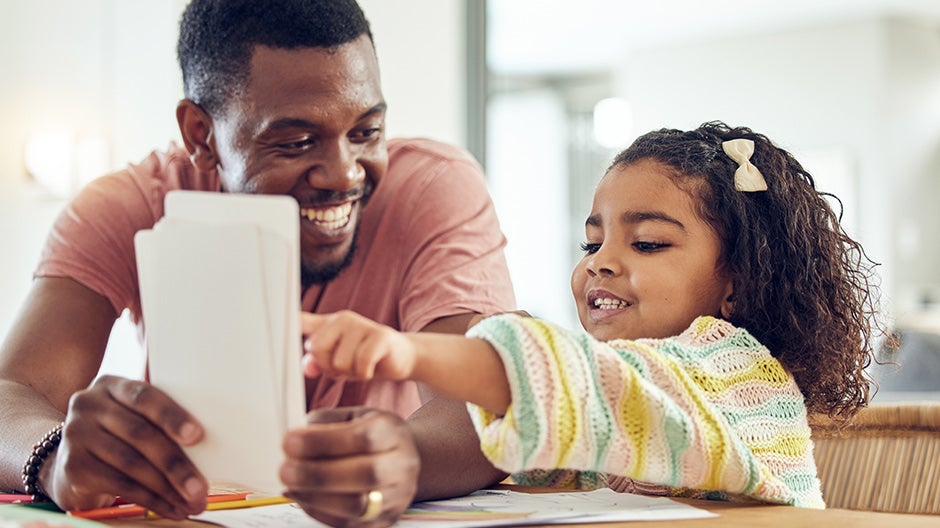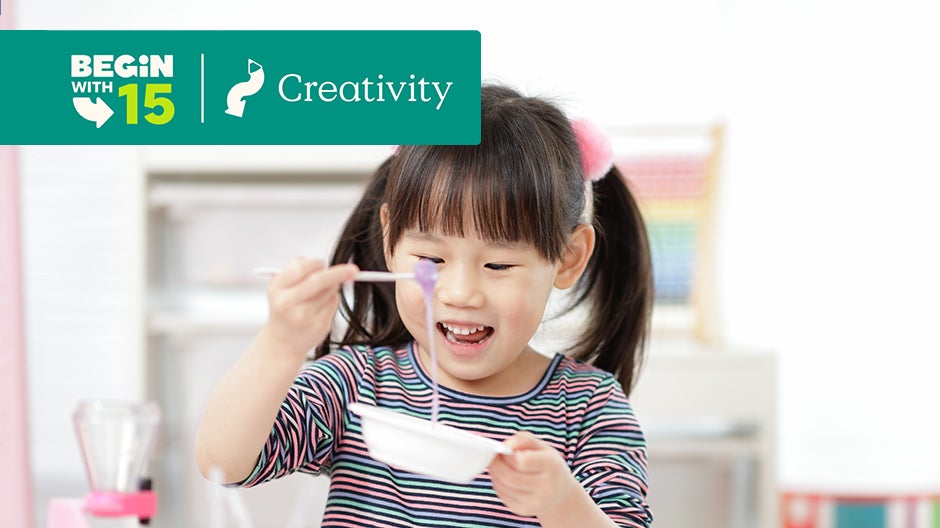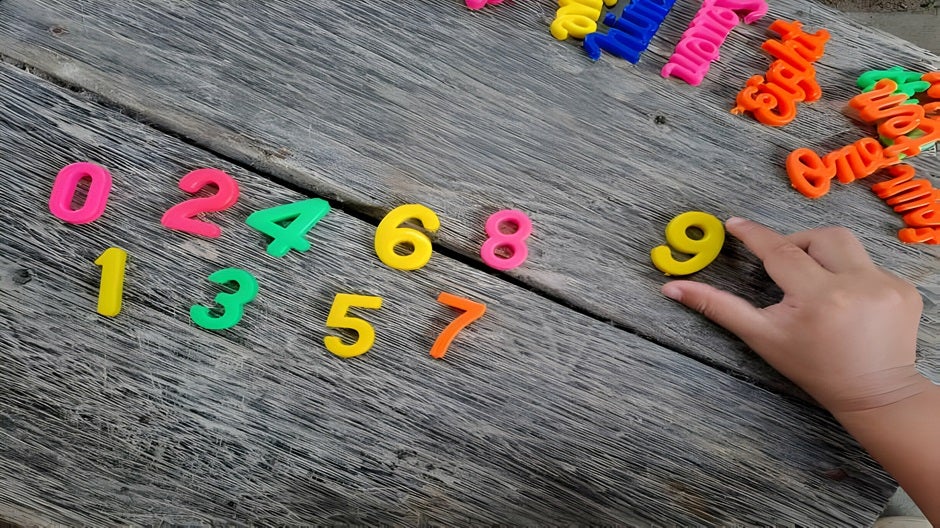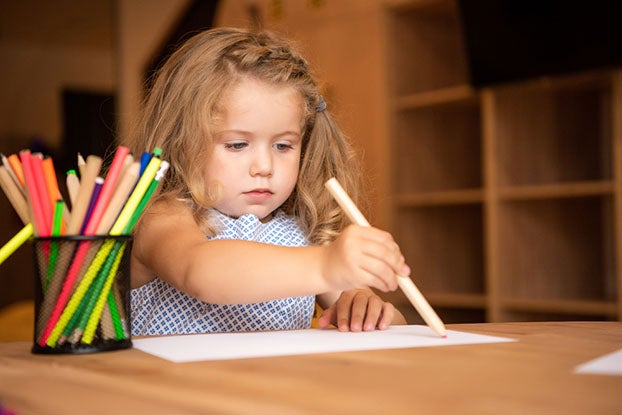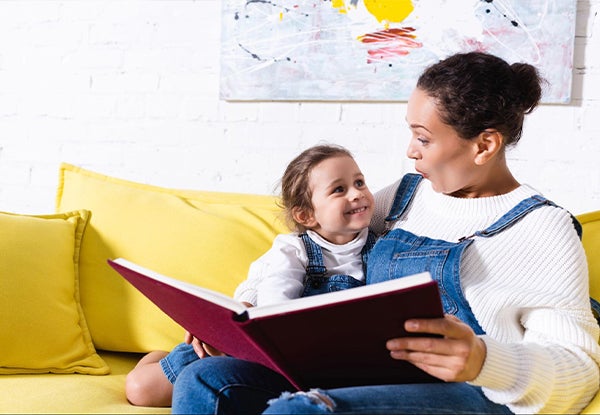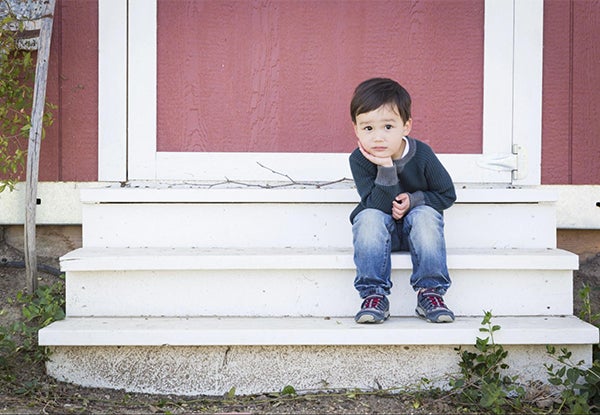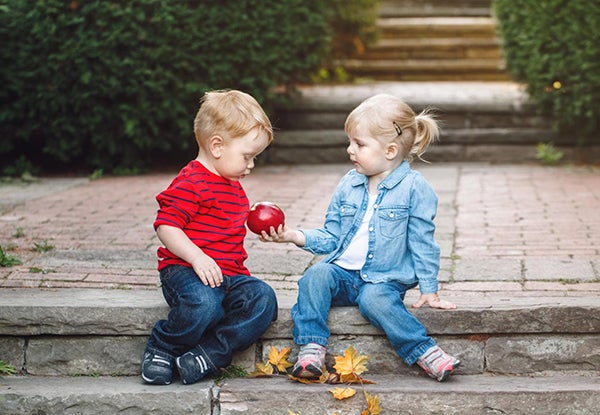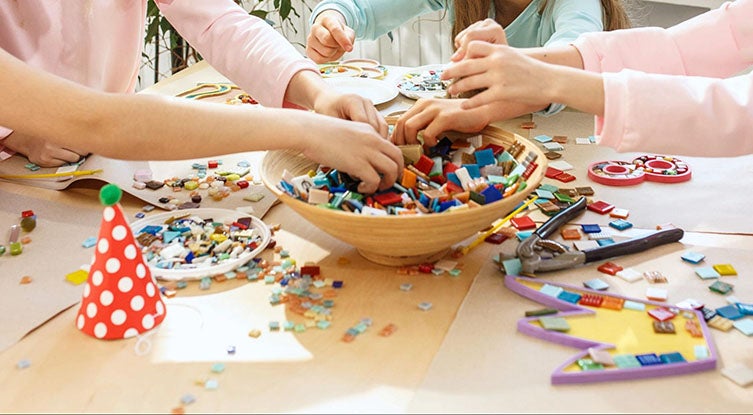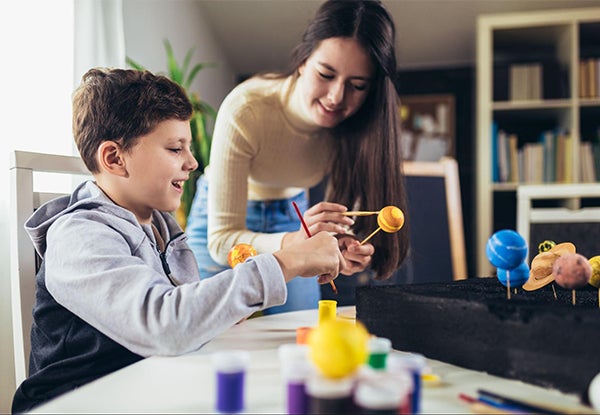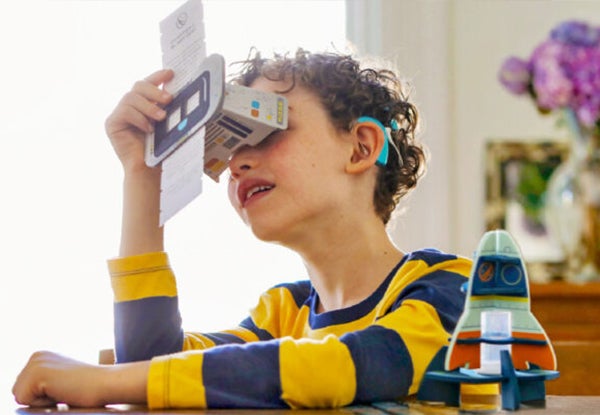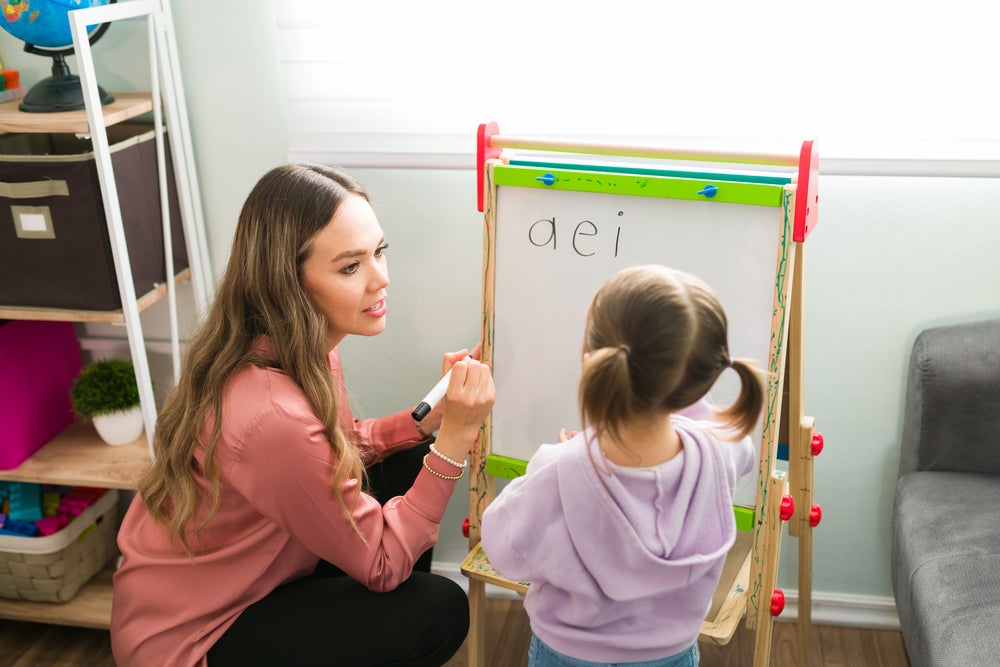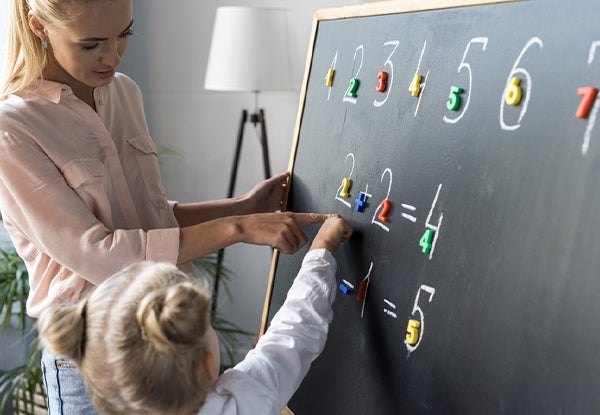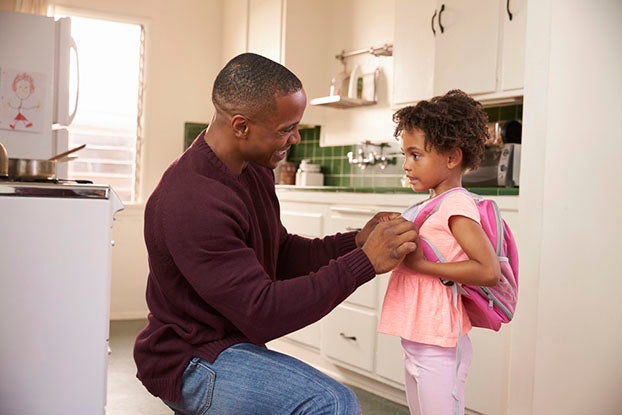Have you ever wondered why early childhood education is such a big deal? Well, when you imagine your child thriving in high school or as an adult, what do you see as the path that brought them there?
Does it start with them collecting rocks on a walk with you now? How about pointing at a picture book and naming emotions? Cooking together in the kitchen?
Their early childhood education—whether it’s what they do in preschool or daycare or what they do at home with you—has important impacts down the road.
Rock collecting can lead to them being more curious in high school. Naming their emotions prepares them to build strong relationships. Cooking can teach them critical thinking and early math skills.
Wonder how you can be an integral part of creating a positive early learning impact on your child? We’ve got some answers for you!
The Short Cut
- Early childhood education, both formal (daycare and preschool) and informal (at home, museum exhibits, library reading hour), is an important part of setting kids up for long-term success
- When kids have high-quality learning experiences in early childhood, especially when combined with secure attachments, they’re more likely to graduate high school, less likely to end up in the criminal justice system, are healthier as adults, and earn more over their lifetimes
- Kids encouraged in Begin’s 5 C’s (Core Skills, Creativity, Critical Thinking, Curiosity, and Character) as part of their early childhood learning experiences are more engaged in school and score better in reading and math
- Begin offers a play-based learning membership rooted in the 5 C’s, delivering learning at the right time and in the right way for every child
7 Reasons Early Childhood Education Is Important
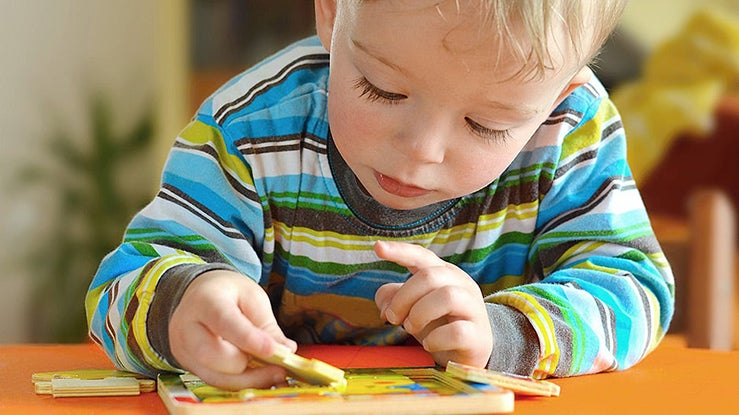
Offering your child a rich early childhood education gives them the opportunity to fall in love with learning before they go into their first classroom. It also takes advantage of the flexibility of their brain to get them primed for later learning.
Early childhood education is so important that the United Nations recognizes it as a dedicated target in its Sustainable Development Goals.
Target 4.2 specifically asks countries to “ensure that, by 2030, all girls and boys have access to quality early childhood development, care and pre-primary education so that they are ready for primary education.”
Some of the biggest reasons early childhood education is important include:
1) Shaping Growing Brains
Children’s brains develop at an astonishing rate between birth and eight years old. During these years, their brains are changing rapidly. They respond to their environment and experiences with the creation of billions of neural connections.
A rich early childhood education shapes that environment and those experiences in a way that promotes lifelong learning. When kids have healthy, positive, and stimulating early years, it shapes their minds in ways that lead to long-term well-being.
2) Building a Foundation for Literacy and Numeracy
Literacy and numeracy sound like advanced skills—and they can be!—but working on them with even very young kids isn’t outside of your reach.
Activities like reading books to your child and making up stories together are part of literacy preparation. And playing music, doing puzzles, and counting everyday objects as part of your daily routine are precursors to numeracy.
Having those basic pre-writing and early math skills at school entry sets kids up for long-term academic success.
3) Discovering Learning Challenges and Needs
Some kids are naturally drawn to math concepts or fast to pick up the meaning of phonemes. Others emotionally regulate themselves more easily outside than in your home. And others may have trouble paying attention and following directions.
The earlier you begin to identify your child’s particular skills and needs as they relate to learning, the sooner you can help them find opportunities to practice what they’re good at and help them learn how to face challenges. These skills, in turn, help them throughout their lives.
4) Nurturing Social and Emotional Skills
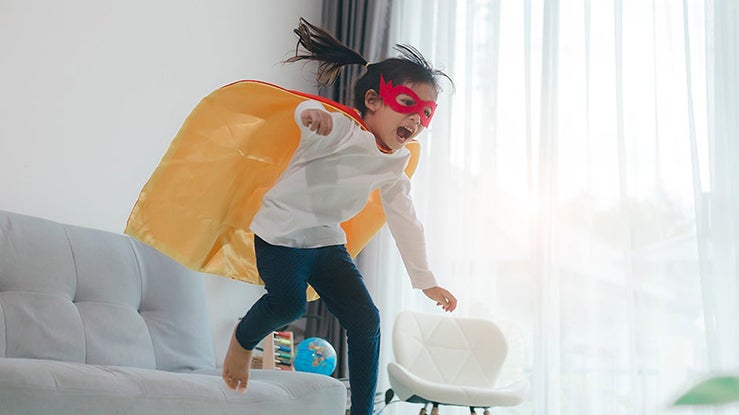
Whenever you’re dressing up and role-playing with your child, taking them to the park to meet peers, or giving them a chance to practice collaborative play at daycare or a playgroup, you’re encouraging your child to develop social skills. This helps them develop meaningful relationships at all ages.
And if you help your child identify and express their feelings, you’re paving the way for better relationships, improved conflict resolution, and empathy.
5) Establishing Secure Relationships
As your child practices their social skills with you, they’ll also be forming relationships with various other people in their life, like friends, teachers, and neighbors. As these relationships grow, your child may begin to feel a sense of safety and develop trust with these people.
Developing these relationships at an early age has far-reaching benefits. If your child feels supported and heard, they can begin to work on skills like cooperation and emotional regulation. These skills make learning in a classroom or community much easier.
6) Developing Good Habits
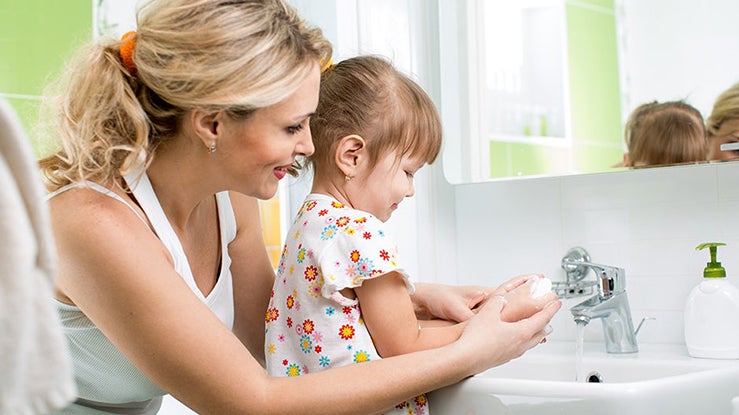
You can add intentional learning time into your child’s day by incorporating it as part of a routine.
So you might make a point to use your bedtime reading ritual to talk about characters and their emotions or how the plot of the story is sequenced. Or you might practice counting while washing hands before dinner.
Kids feel reassured by a routine. It can reduce their anxiety because they know what to expect. It can also inspire them to practice independence.
For example, if they know you always go for a walk together after dinner, one evening they may finish eating and rush to their shoes to attempt to put them on by themselves.
7) Instilling a Lifelong Love of Learning
Centering your child’s early learning on having fun will go a long way toward cultivating a passion for exploring new things and gaining knowledge. If they enjoy learning at a young age, they’re likely to stay more open to it as they get older.
Helping your child develop motivation to learn is also an important aspect of early childhood education. If they’ve got the internal drive to explore new ideas and try new things, they’ll go fa
The Importance of Early Childhood Education Outside the Home
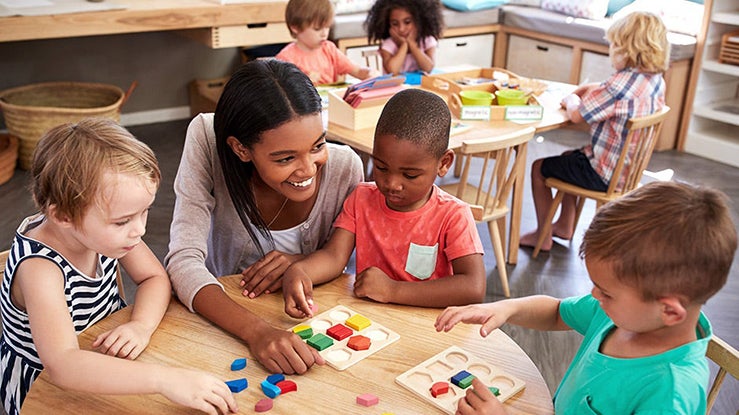
One of the best ways to get a good early childhood education is through quality daycare and preschool.
When they go to a high-quality daycare and preschool, kids build stable relationships, experience safe and stable environments, enjoy nutritious meals, and establish health-promoting behaviors. They also work on emotional well-being and literacy skills, creativity and curiosity, and executive functioning skills—all in a safe and dependable place.
These positive effects matter for all kids! It doesn’t matter if you work full-time and rely on daycare or send your child to preschool part-time because you want them to have more social experiences—high-quality formal early childhood education makes a difference for kids and can improve:
- Cognitive skills
- Social and behavior skills
- Language and math skills
- High school graduation rates
- Chances of not getting involved in the criminal justice system
- Adult health
- Lifelong earnings
Nurturing Early Childhood Education in Your Home
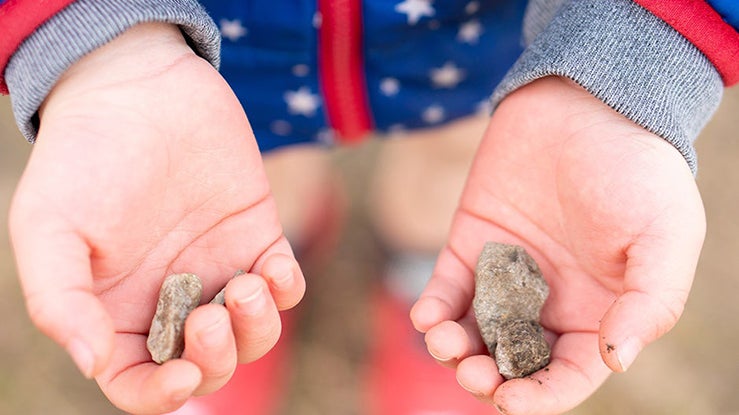
While formal education is helpful, it’s not all that matters. You have an enormous impact on your child’s early education—and you don’t have to follow a curriculum to do it!
As their primary caregiver, you create their first secure bond. This allows them to feel safe in their environment and courageous in their pursuit of what lies outside of it.
Beyond that, because you spend so much time with your child (and they’re so attuned to your interests in their early years), you have lots of chances to help them learn critical skills.
Great learning materials to have on hand include:
- Books
- Objects for outdoor play (like sticks, rocks, and shells)
- Toys for outdoor play (like chalk, balls, and bikes)
- Objects for indoor play (like pots and pans, laundry baskets, and tissue boxes)
- Toys for indoor play (like dress-up clothes, blocks, and puzzles)
- Art materials (like paper, tape, and kid-safe markers or paints)
Reading books, cooking, building with blocks, painting a picture, and going on nature scavenger hunts are a few everyday activities that help your child learn important skills. You can also work on:
- Phonemic awareness
- Emotional regulation
- Letter recognition
- Early math
- Sensory activities
- Learning shapes
- Teaching kindness
- Artistic expression
- Naming feelings
- Counting
And much, much more—all through simple activities and everyday play. To help you get started, let’s look at some specific things you can do.
30 Simple Early Childhood Education Activities
Try these fun activities to help your child build their skills. We divided them into three age groups: babies, toddlers, and preschoolers. That way, you can find the best fit for your little one!
Babies
1) Tummy Time Treasure Hunt
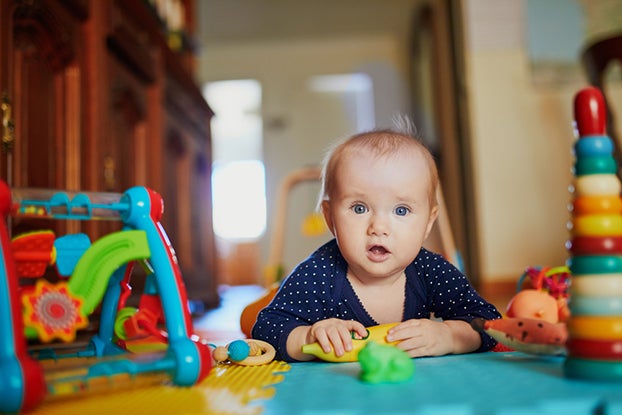
Place a few safe, colorful objects around your baby during tummy time and encourage them to reach out and grab them. They’ll work on their hand-eye coordination and gross motor skills.
2) Peek-a-Boo!
This classic game never gets old! Cover your face with a blanket or towel, then pull it off to reveal your face as you say, “Peek-a-boo!”
Babies love the element of surprise, and this activity encourages social interaction and facial recognition.
3) Let’s Chat
Talk to your baby. You can narrate your day, tell them a story from your childhood, or just have a conversation.
As your little one listens, you’ll expose them to more of the English language. This can help improve their vocabulary and language skills.
4) Flip the Switch
Help your baby flip a light switch by holding them up and using hand-over-hand guidance. They’ll begin to develop an understanding of cause and effect.
5) “Flying” Carpet
Once your baby has a bit more control over their body (after about six months), place them on their tummy on a soft blanket. Then hold onto a corner and very slowly pull them around the room, watching for obstacles as you do.
While enjoying the ride, they’ll build their core strength and balance.
6) Copycat
Interact with your baby and then pause, giving them time to mimic you. Here are some things you can do:
- Blow a raspberry
- Make a silly face
- Smile
- Clap
Next, let your child be the leader. Observe them and mimic their movements and sounds. Both activities help develop early communication skills.
7) Baby Obstacle Course
Once your baby learns to crawl or scoot, encourage them to move by creating a safe obstacle course.
It can include:
- Tunnels to go through
- Stuffed animals to play with
- Pool noodles to move
As your little one navigates the course, they’ll practice critical gross motor skills, like balance and coordination. They’ll also plan their movements and think about how to tackle each obstacle.
8) Pulling Fabric Scraps
Stuff an old tissue box full of random fabric scraps and encourage your little one to pull them out. As they reach in and grasp each piece, they’ll work on their fine motor skills. And since they’re learning about cause and effect, they’ll also build their cognitive skills.
9) Baby Massage

Help your little one gain awareness of their body and relax by giving them a gentle baby massage. Pick a baby-safe lotion or oil and focus on their arms, legs, back, and tummy. Use soft, circular strokes and watch your baby’s reactions.
If they seem fussy or uncomfortable, stop. But as long as they enjoy the massage, talk to them about what you’re doing and name each part.
10) Counting
Introduce your baby to math by counting together often. You can read counting books, sing counting songs, or just count their toes and fingers. The more you count, the more familiar they’ll become with numbers.
Toddlers
11) Sensory Bins
Expose your toddler to different textures, colors, and objects with toddler-safe sensory bins. Add a filler like water or kinetic sand to a large plastic bin. Then add some toys or household objects for them to play with.
As they use their senses to engage with the materials, they’ll use their fine motor skills and work on hand-eye coordination. They’ll also become more curious and creative as they explore the bin’s contents.
12) Nature Walks
Get outside together and see what’s around you. Encourage your little one to smell flowers, touch leaves, and observe insects and animals. Talk about what you see and hear so they can practice their language skills.
13) Playdough
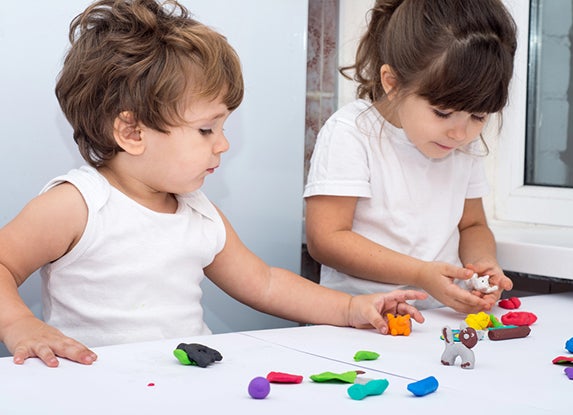
Playing with playdough is great for developing fine motor skills. Your toddler can squeeze, roll, and mold the dough into different shapes and objects.
If they’re developmentally ready, add tools like child-safe cookie cutters or plastic knives to enhance their creativity.
14) Painting with Water
Set your toddler up in their high chair and give them a bowl of water, a piece of colorful paper, and a paintbrush.
Show them how to get water on the brush and “paint” the paper. It’s a fun way to build their fine motor skills and encourage creativity.
15) Tearing Newspaper
Hand your toddler a piece of old newspaper and let them rip it to shreds. This improves their fine motor skills.
16) Dance Party
Turn on the music and get moving! Play songs from different genres and encourage your toddler to dance along. To make it even more fun, add some simple props like scarves or shakers for them to use.
Musical exposure can impact their intelligence and help them develop cognitive skills.
17) Learn with Sesame Street
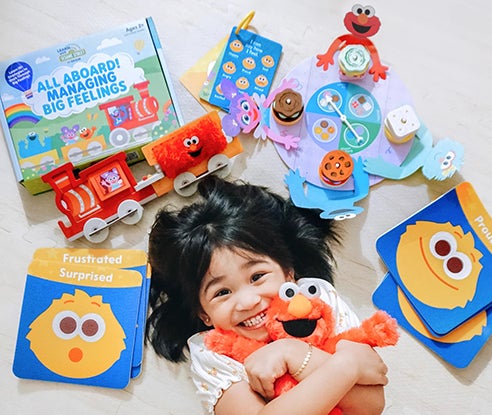
Once your little one is two and a half years old, they’re the perfect age for a Learn with Sesame Street Premium Subscription from Begin. Each month, you’ll get a delivery for hands-on learning and fun.
You’ll also receive instant access to the Learn with Sesame Street by Begin app to help your toddler learn to navigate their feelings. It’s a great introduction to social-emotional learning.
18) Alphabet Play
While your toddler may not be ready to recite the alphabet, early literacy exposure helps set them up for success. You can:
- Hang an alphabet chart
- Sing the alphabet song
- Play with foam letters
- Talk about the letters in their name
Keep it light and playful and let your child explore the letters and their sounds in a fun way.
19) Puppet Show
Give your toddler a paper bag and some crayons and let them create a puppet. Then show them how to make it “talk” by putting their hand inside.
Ask them to put on a show for you, and then put on one for them. This early language activity encourages storytelling, creativity, and imagination.
20) Emotional Faces
Make different emotional faces and talk to your child about how you feel when you make each one. For example, make a happy face and say, “I feel happy. I’m smiling because I got to play with you.”
As you talk about emotions together, you’ll help your toddler learn to identify their own emotions and promote empathy.
Preschoolers
21) Action Songs
Preschoolers love music and movement. Sing action songs like “Head, Shoulders, Knees, and Toes”, “The Hokey Pokey,” and “If You’re Happy and You Know It.”
These songs promote coordination and listening skills while encouraging your little one to follow directions.
22) Scavenger Hunt
Print out a picture-based scavenger hunt (like this Outdoor Scavenger Hunt) and go on a nature walk with your preschooler. Encourage them to find each item and check it off the list.
As they complete the hunt, they’ll work on their observational skills and get some physical activity.
23) Memory Games
Play memory games with your preschooler using objects around the house. Place a few items in front of them, let them look for a minute, then have them close their eyes while you take one away.
Ask them to look again and guess what is missing. It’s a simple (and fun) way to improve memory skills, focus, and concentration.
24) Junk Mail Forms
If you get any junk mail, let your preschooler open it up and use a pen or pencil to pretend to fill out any forms inside. This type of pretend play helps them practice fine motor skills.
25) Learn about the World
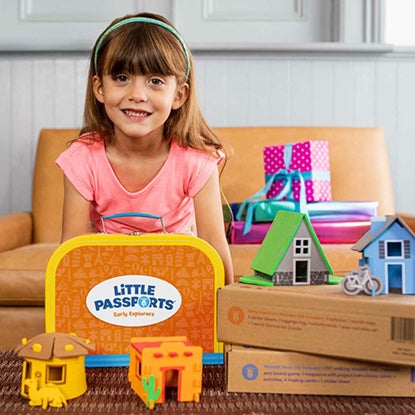
Sign your preschooler up for a Little Passports Early Explorers Subscription and let them explore the world. Each monthly kit contains crafts, activities, and treasures to help them learn.
The kits will introduce them to different countries and cultures. Every delivery helps ignite a love for learning.
26) Rhyming Songs
Build essential phonological awareness by singing rhyming songs. Here are some of our favorites:
- Down by the Bay
- Wheels on the Bus
- Over in the Meadow
- Five Green and Speckled Frogs
- Willoughby Wallaby Woo
27) Color Sort
If your child is eating a colorful snack, encourage them to divide the pieces by color before eating. This simple activity helps build early math skills and teaches them to notice details.
28) Gardening
Planting a garden is an excellent way to teach your preschooler about responsibility, patience, and how plants grow. Let them choose the seeds, dig holes, and water the garden regularly.
As they watch their plants grow, they’ll learn valuable lessons about caring for living things and develop an appreciation for nature.
29) Animal Study
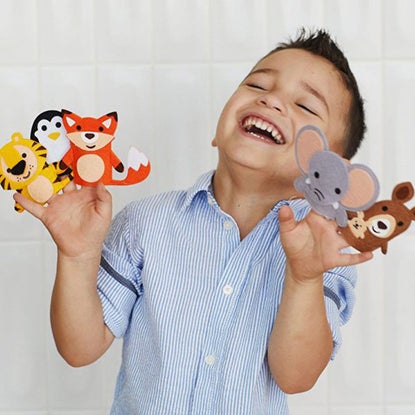
Introduce your preschooler to the animal kingdom with the Animal Tracks: Puppets, Habitats & Toby Plush kit from Little Passports. This scientific kit helps them learn about animal habitats, world geography, and more.
30) Emotion Masks
Use paper plates and basic art supplies to create emotion masks. Your child can integrate these into their role play to learn about emotions and how to express them.
The Begin Approach to Early Childhood Education
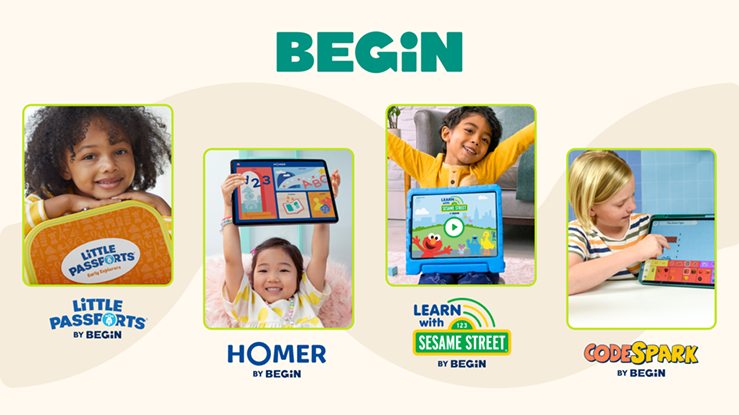
Doing early childhood education at home gives kids a head start when they enter a formal school system. They go into school with core academic and critical thinking skills, curiosity and the confidence to share it, comfort with expressing themselves creatively, and the social skills to build their character.
At Begin, we understand the importance of early childhood education, and we make it easy for parents.
Whether your child is learning with you, a daycare provider, or a teacher, Begin can help you (all of you!) build their capacity for learning. Our age- and stage-matched learning membership supports your child every step of the way.
Take our online quiz today to discover which stage of our membership is best for your family!
